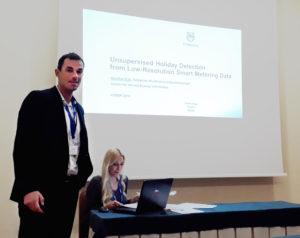 The planned Smart Meter rollout at a large scale has raised privacy concerns. In order to protect the customer’s privacy, researchers of the Center are exploring the security of user data.
The planned Smart Meter rollout at a large scale has raised privacy concerns. In order to protect the customer’s privacy, researchers of the Center are exploring the security of user data.
Günther Eibl, Sebastian Burkhart and Dominik Engel investigated holiday detection based on energy consumption data. Their paper named “Unsupervised Holiday Detection from Low-Resolution Smart Metering Data” was presented recently at the 4th International Conference on Information Systems Security and Privacy in Madeira by Günther Eibl.
The explored dataset is the first realistic (in terms of number of households and measurement duration) smart meter dataset that is analyzed using occurrence or holiday detection methods. Some exemplary households were presented in order to discuss issues like background appliances, daydependent background signal characteristics or the existence of unplausible values. Using a reformulation of the holiday detection problem as a classification problem a new, dedicated holiday detection method is presented.
This work sets the starting point for holiday detection and raises a number of technical issues for future work: modeling and removal of background appliances, choice of thresholds, feature selection, proper modeling and smoothing of the day-dependent night distributions, inclusion of other predictive variables like day of the week and of course evaluation for labelled datasets. Considering the privacy perspective it would be interesting to investigate possible privacy consequences apart from the detection of secondary residences.
For further details, please see:
-
![[PDF]](https://www.en-trust.at/wp-content/plugins/papercite/img/pdf.png)
![[DOI]](https://www.en-trust.at/wp-content/plugins/papercite/img/external.png) G. Eibl, S. Burkhart, and D. Engel, “Unsupervised Holiday Detection from Low-Resolution Smart Metering Data,” in Proceedings of the 4th International Conference on Information Systems Security and Privacy, ICISSP 2018, 2018, p. 477–486.
G. Eibl, S. Burkhart, and D. Engel, “Unsupervised Holiday Detection from Low-Resolution Smart Metering Data,” in Proceedings of the 4th International Conference on Information Systems Security and Privacy, ICISSP 2018, 2018, p. 477–486.
[Bibtex]@inproceedings{Eibl18a, abstract = {The planned Smart Meter rollout at a large scale has raised privacy concern. In this work for the first time holiday detection from smart metering data is presented. Although holiday detection may seem easier than occupancy detection, it is shown that occupancy detection methods must at least be adapted when used for holiday detection. A new, unsupervised method for holiday detection that applies classification algorithms on a suitable re-formulation of the problem is presented. Several algorithms were applied to a big, realistic smart metering dataset that – compared to existing datasets for occupancy detection – is unique in terms of number of households (869) and measurement duration ({\textgreater}1 year) and has a realistic low time resolution of 15 minutes. This allows for more realistic checks of seemingly plausible but unconfirmed assumptions. This work is merely a first starting point for further research in this area with more research questions raised than answered. While the results of the algorithms look plausible in a visual analysis, testing for data with ground truth is most importantly needed.}, author = {Eibl, G{\"{u}}nther and Burkhart, Sebastian and Engel, Dominik}, booktitle = {Proceedings of the 4th International Conference on Information Systems Security and Privacy, ICISSP 2018}, doi = {10.5220/0006719704770486}, keywords = {Privacy,Smart Grids,Smart Metering,privacy}, pages = {477--486}, publisher = {SciTePress}, title = {{Unsupervised Holiday Detection from Low-Resolution Smart Metering Data}}, year = {2018}, pdf = {http://www.en-trust.at/papers/Eibl18a.pdf}, }